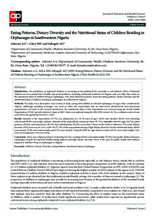Abstract
Introduction: The population of orphaned children is increasing at devastating levels especially in sub-Saharan Africa. Orphaned children are at increased risk of health and social problems, including nutritional problems. In Nigeria only very little data exists on the nutritional status of children living in orphanages. This study therefore aimed to assess the eating patterns, dietary diversity and the nutritional status of children residing in orphanages in southwestern Nigeria.
Methods: The study was a descriptive cross-section al study among 260 children in selected orphanages in Lagos State, southwestern Nigeria. Multistage sampling technique was used to select the respondents and an interviewer administered semi-structured questionnaire was used as the research instrument. The nutritional status of the respondents was assessed using the World Health Organization (WHO) growth reference values of 2007. Data were analyzed using the IBM SPSS version 24. The confidence interval was set at 95% with significant level at P < 0.05.
Results: Majority of the respondents (52.7%) was adolescents (i.e. 10-19 years of age), 54.6% were females, 90.4% were attending schools and 90.0% were single-orphans. Majority of the respondents consumed fruits (97.7%), vegetables (80.0%), eggs (92.7%), plant proteins (95.4%), animal proteins (96.2%) and carbohydrates (96.2%) more than 3 times in the week of reference. The mean dietary diversity (DD) score was 4.6 ± 0.5, with 150 (57.3%) of the respondents having a high dietary diversity. For the nutritional status, 60.6% were wasted, 55.9% were underweight and 62.3% were stunted. Using the BMI-for-age reference values, 68.1% were underweight, 5.4% were overweight and 3.5% were obese.
Conclusion: There was a high prevalence of stunting (62.3%), wasting (60.6%) and underweight (55.9%) among the children living in orphanages, despite the reported healthy eating patterns and high dietary diversity. There is the need for public health interventions targeted at children living in orphanages in Nigeria.

